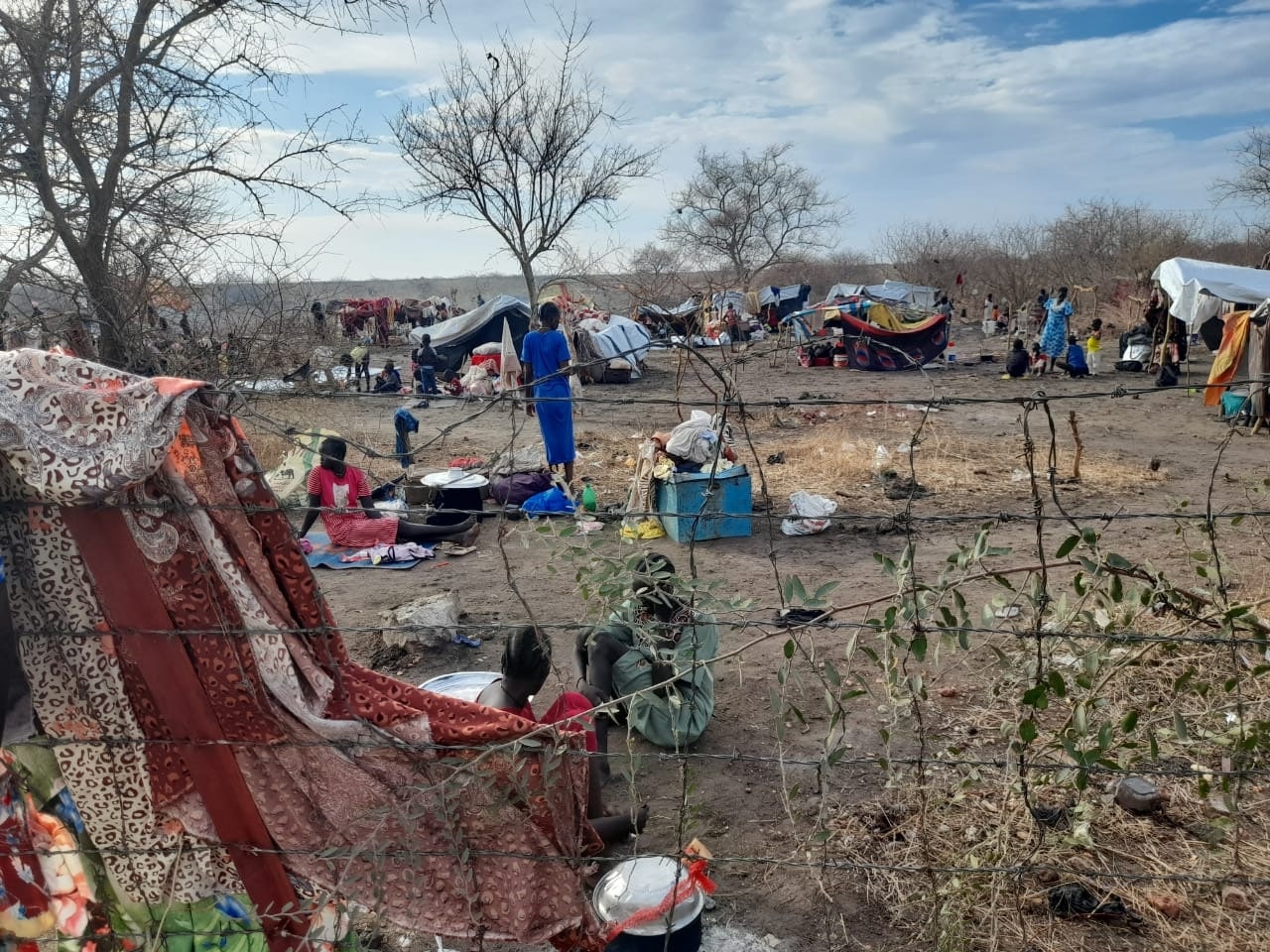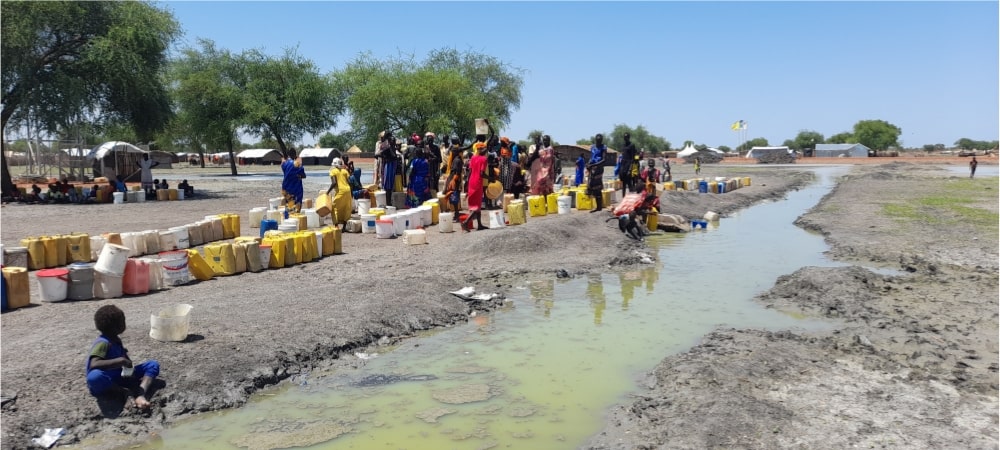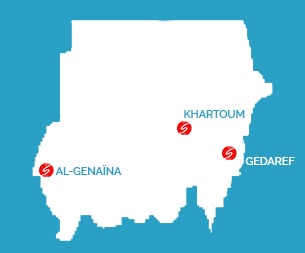For more than four months, a conflict that began on April 15, 2023 between paramilitary forces (RSF) and the Sudanese Armed Forces (SAF) has been ravaging Sudan. Despite ceasefire agreements, the violence continues to escalate and spread to new towns. Thousands of people are forced to flee to safety. While some are taking refuge in villages still untouched by the violence, others are crossing the border. SOLIDARITÉS INTERNATIONAL is present in several of these neighboring countries.
In Sudan, the war continues unabated
Long concentrated in Khartoum and certain towns in Darfur, the fighting has spread to other Sudanese regions, such as North Kordofan, a commercial and transport hub, as well as Al-Facher and Al-Foula, the capital of Kordofan. New densely-populated towns have come under fire in a war that began four months ago.
More than 4.8 million people have been forced to flee, abandoning their homes and possessions. According to the International Organization for Migration (IOM), the current estimate of the total number of people recently displaced within Sudan is almost 3.8 million.
In addition to internal displacement, the conflict in Sudan has led to cross-border movements of over a million refugees to neighboring countries, namely Chad, Egypt, Libya, Central African Republic, South Sudan and Ethiopia. Most arrivals were reported in Chad (41%), Egypt (26%) and South Sudan (22%) (1).
Added to this already grim picture is the likelihood of further displacement, due to heavy rains, flooding and inter-community clashes. Every year, the rainy season, which affects Sudan and its neighboring countries, brings epidemics and destruction, jeopardizing the agricultural season. The increasingly critical situation in the region makes humanitarian aid essential.
Sudan
Context and action- 43 million inhabitants
- 172nd out of 191 countries on the Human Development Index
- 21.000 people helped
Chad, first destination for refugees
With almost 1,000 km of borders shared with Sudan, Chad is the country hosting the largest number of refugees fleeing the conflict in Sudan. As of August 30, 2023, 440,000 new arrivals had been registered in the country, the majority of them Sudanese fleeing conflict. This situation has plunged the country into an even greater humanitarian crisis.
Inflation has reached 70% in regions close to the border, such as the provinces of Ouaddaï, Sila and Wadi Fira. Health infrastructures and resources in terms of water, arable land, inputs and foodstuffs are insufficient to cover the needs of displaced persons and host communities, which are themselves vulnerable. This critical context weakens social cohesion, encourages conflict and fosters the development of criminal activities.
In the provinces of Ouaddaï and Sila, where the displaced are taking refuge, living conditions are difficult. Water resources, food, livelihoods and shelter are limited. Most displaced people find themselves sleeping outdoors or in communal areas such as schools. Obtaining hygiene products, having access to a functional sanitation system or even finding clothing is a complex task.

In response to the emergency in these provinces, SOLIDARITÉS INTERNATIONAL is providing emergency assistance in a number of sectors to displaced people and the families hosting them. It is improving access to basic water services by rehabilitating boreholes and installing water points. Our teams have built showers and latrines, which they are responsible for emptying. They install hand-washing facilities and garbage cans at community level and in high-traffic areas. Our NGO also distributes hygiene kits, while raising awareness of best practices to prevent the spread of disease. The most vulnerable displaced families also receive food aid through the distribution of cash to enable them to buy supplies at the markets.
The current rainy season in the region is complicating the delivery of aid, particularly in Sila Province, where rising water levels have made certain areas inaccessible since the beginning of July. Nevertheless, our teams have been able to plan ahead, drilling boreholes and transporting the necessary equipment and materials in advance. They are also concentrating their aid on urgent needs in Ouaddaï, which has been less affected by the rainy season.
Repercussions in South Sudan
South Sudan has not been spared by the Sudanese conflict. Its impact is already being felt on prices, which continue to rise. Indeed, the increase in displacements in the country, particularly in Upper Nile and Unity states. In addition to the already internally displaced, more than 245,000 people have arrived from Sudan, mainly South Sudanese returnees.
This situation is likely to generate and reinforce existing community and inter-ethnic tensions, particularly over access to land and limited natural resources. On the health and humanitarian fronts, the situation is catastrophic and the needs are considerable. Epidemics of water-borne diseases and measles are multiplying, while access to drinking water remains difficult and sanitary infrastructures are lacking. Food insecurity and malnutrition are steadily increasing in some regions.

SOLIDARITÉS INTERNATIONAL has been present in Upper Nile State since 2006. On site, our teams have developed an emergency response to deliver the necessary humanitarian aid to displaced people in so-called “transit” areas such as Renk and Malakal. A medium-term response is also planned, focusing on displaced and host populations at final destinations. The current rainy season in South Sudan makes the need for shelter much more urgent. Our teams are carrying out a variety of actions in the IDP (internally displaced persons) sites. In particular, they truck in water, run hygiene awareness sessions, distribute kits containing essential personal hygiene products and the materials needed to build a shelter, and install latrines and showers.
In the state of Unity, our teams carry out similar activities. They supply displaced people with water, distribute kits containing essential personal hygiene products and run hygiene awareness sessions. In the coming months, SOLIDARITÉS INTERNATIONAL will also be distributing shelter kits and cash to enable people to buy food in the markets.
These actions will continue and be reinforced to meet the many challenges and impacts of the Sudanese conflict on these neighboring countries.

